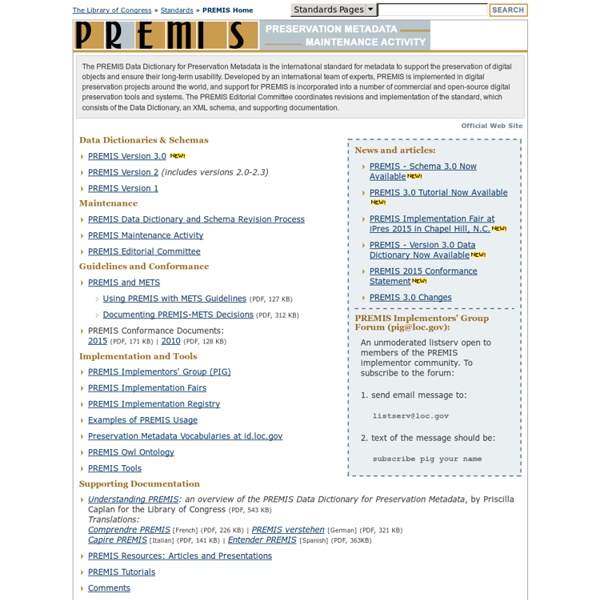DCMI Metadata Terms
This document is an up-to-date, authoritative specification of all metadata terms maintained by the Dublin Core Metadata Initiative. Included are the fifteen terms of the Dublin Core Metadata Element Set, which have also been published as IETF RFC 5013 [RFC5013], ANSI/NISO Standard Z39.85-2007 [NISOZ3985], and ISO Standard 15836:2009 [ISO15836]. Each term is specified with the following minimal set of attributes: Where applicable, the following attributes provide additional information about a term: This release of DCMI Metadata Terms reflects changes described more fully in the document "Maintenance changes to DCMI Metadata Terms" [REVISIONS]. References
Metadata Librarian Experience
Virtual Library
Links to full text books, pamphlets, newspapers and historical documents on the World Wide Web Contents: Methodology: The Costs of Digital Imaging This article, by NARA staff member Steve Puglia, appeared in the October 15, 1999 issue of RLG DigiNews. Links to several recent reports on the costs of digitization are provided by the author. Top of Page Digital Collections: The Avalon Project (Yale Law School) Documents relevant to the fields of Law, History, Economics, Politics, Diplomacy and Government. Subject-oriented Virtual Collections: African American History: Digital Library This site links black history information in libraries across the country. E-Book Collections (Full-text): Alex Catalog of E-Texts (University of California, Berkeley) A full-text collection of digital documents collected in the subject areas of English literature, American literature, and Western philosophy.
QA Focus Case Studies
The QA Focus project published a series of case studies which provided examples of quality assurance procedures and illustrate how projects and services implement standards and best practices in order to achieve interoperability, maximise accessibility, etc. Case studies are available in the following areas: Note that if you wish to access all of the case studies in a single file (which is suitable for printing) you should go the the View-All links on this page. Note also that information on writing a case study is also available. RSS Feeds You should also note that RSS feeds of the case studies are available. Case Study Documents Standards Standards And Accessibility Compliance In The FAILTE Project Web Site, (case study 02)[HTML format] (see also Access / Web)Standards For e-learning: The e-MapScholar Experience, (case study 05)[HTML format] (also related to standards)Standards and Accessibility Compliance for the DEMOS Project Web Site, (case study 10)[HTML format] (see also Access / Web)
Publishes Themed Issue of Information Standards Quarterly on Linked Data for Libraries, Archives, and Museums
For release: 10 Sep 2012 Baltimore, MD - September 10, 2012 - The National Information Standards Organization (NISO) announces the publication of a special themed issue of the Information Standards Quarterly (ISQ) magazine on Linked Data for Libraries, Archives, and Museums. ISQ Guest Content Editor, Corey Harper, Metadata Services Librarian, New York University has pulled together a broad range of perspectives on what is happening today with linked data in cultural institutions. He states in his introductory letter, "As the Linked Data Web continues to expand, significant challenges remain around integrating such diverse data sources. As the variance of the data becomes increasingly clear, there is an emerging need for an infrastructure to manage the diverse vocabularies used throughout the Web-wide network of distributed metadata. Four "in practice" articles illustrate the growth in the implementation of linked data in the cultural sector. For More Information, Contact:
NLM Metadata Schema
(Approved February 2002) (Revised July 29, 2004) The NLM metadata schema is based on the metadata terms maintained by the Dublin Core Metadata Initiative, including elements, element refinements, encoding schemes, and vocabulary terms (cf. In the list which follows, the elements in the NLM Metadata schema are outlined using the following conventions: The key used for "Identifier" is: DC = Approved Dublin Core elements and qualifiersNLMDC = Approved Dublin Core elements with NLM-defined qualifiersNLM = NLM-defined elements The key for the element requirements is: R = RequiredRA = Required if applicableO = Optional Element: Title Name: Title Identifier: DC.Title Definition: A name given to the resource Required: R Repeatable: N Comments: N/A Element: Alternative Title Name: Alternative Title Identifier: DC.Title.Alternative Definition: Substitute or alternative names given to the resource, including subtitles, acronyms, translations, etc. Element: Type
Video: How dirty is the cloud? | Need to Know
You’ve heard about the Foxconn factory in China where your iPad is assembled. But have you ever considered the energy required to store your emails, photos, and videos in the cloud? As worldwide demand for data storage skyrockets, so do the power needs of the servers where all our digital archives live. While some companies (like Facebook) have made great progress in ditching dirty fossil-fuel energy for cleaner renewables, a few internet giants lag far behind. Apple’s new Maiden, N.C., data center is only one of many coal-fueled server farms across the country. See a full-screen version here. The figures in the map are for individual data centers. 2. 3. 4. 5. 6. 7. 8. 9. 10. 12. Additional reporting and production was provided by Alyssa Battistoni, Azeen Ghorayshi and Tasneem Raja.
ISO Archiving Standards - Overview
ISO has encouraged the development of standards in support of the long term preservation of digital information obtained from observations of the terrestrial and space environments. ISO requested that the Consultative Committee for Space Data SystemsPanel 2 coordinate the development of those standards. (CCSDS has subsequently reorganized and the work is now situated in the Data Archive Ingest (DAI) Working Group.) The initial effort has been the development of a Reference Model for an Open Archival Information System (OAIS). The development history of this effort can be seen by surveying the many past US, French, British and International workshops. AWIICS identified significant interest in starting new standardization efforts, and provided starting documents related to Ingest, Identification, and Certification of Archives. An effort examining the Ingest area has produced the Producer-Archive Interface Methodology Abstract Standard. Current efforts are: Upcoming Workshops Past Workshops



